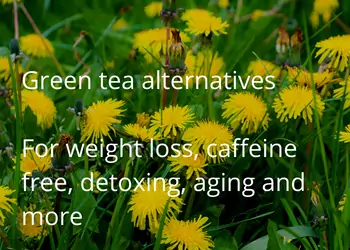We all like to shake it up a bit with our teas from time to time, and often it’s good to seek additional or different benefits that other teas can provide. So I’ve been looking into the best green tea alternatives across a few categories:
- Low-caffeine – Green rooibos tea, and white tea
- Weight loss – Oolong tea, chamomile tea, dandelion tea, and rose tea
- Detoxifying – Ginger and turmeric tea, Lemon tea, and peppermint tea
- Anti-aging – Rooibos tea and Tulsi tea
- Boosting Metabolism – Yerba Mate
Green tea is known for having plenty of benefits that are arguably greater than many other tea varieties.
However, as with pretty much anything, there can be instances where we all look for alternatives that can give similar benefits but are geared towards other medical reasons, such as allergies, or just simply because the flavor of green tea doesn’t suit your taste buds.
Here we’ll list down alternative teas you can opt for to get some of the awesome benefits of tea – that are green tea alternatives.
Green tea alternatives for low caffeine
Let’s get into the list of green tea alternatives.
Green rooibos tea
Ok, so it might say green in the title, but If you’re looking for a tea that has less caffeine than green tea …but won’t sacrifice the flavor, then Green rooibos tea is a great option.
Green rooibos tea replicates the light earthy flavor of green tea, so it’s more like a lighter version of green tea but without caffeine content.
As with regular rooibos tea, green rooibos tea is also a herbal tea and doesn’t come from the true tea plant, camellia Sinensis.
This means that green rooibos tea is free from caffeine. However, as with a regular cup of green tea, green rooibos tea is equally rich in antioxidants.
White tea
For those who are looking for a more minor shift from green tea – mainly to reduce caffeine intake, then white tea can be a good alternative. Especially as it offers a lighter overall flavor than green tea,
White tea also has the lowest caffeine content when it comes to tea varieties.
An 8 -ounce cup of green tea has around 30-50 milligrams of caffeine, whereas an 8-ounce cup of white tea has only about 15-30 milligrams of caffeine.
Find out more about caffeine in white tea here.
And more about the caffeine in green tea here.
I also make a direct comparison between green tea and white tea here.
Talking of flavors, although green and white tea do not share similar taste profiles, they can both offer a whole range of flavors from fresh, vegetal to nutty and sweet.
White tea will however have a lighter flavor than green tea, which you can improve with the right brewing technique, so you can make it stronger or add other ingredients.
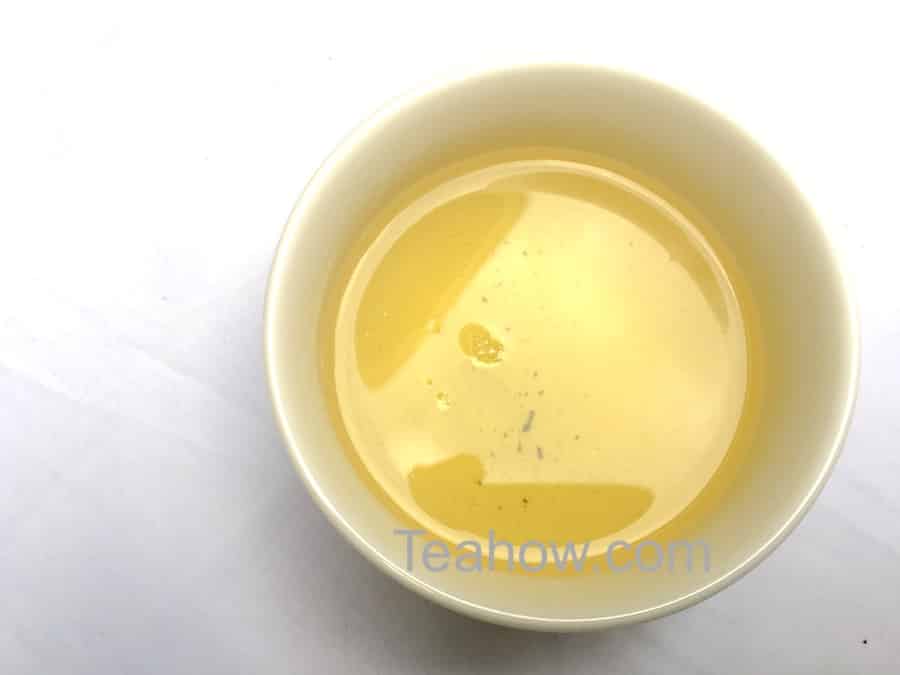
Green tea alternatives for weight loss
If your main purpose for drinking green tea is for weight loss, then there are plenty of herbal teas that are perfect substitutes for this purpose.
Among the many alternatives for green tea that can aid weight loss, and stand out as the best options
- Oolong tea
- Hibiscus tea
- Chamomile tea
- Dandelion tea
- Rose tea
Let’s look at these in a bit more detail…
While their flavor varies from a regular cup of green tea, they all share a common earthy flavor …more like a lighter version of green tea.
Unlike green tea, many herbal teas are caffeine-free and will fit perfectly with your choice, if you want a green tea alternative that is caffeine-free and aids your weight loss goals.
Here is a quick glance at how each of these herbal teas’ might be your green tea alternative:
Oolong tea
Oolong tea actually encompasses a broad spectrum of tastes. With a fusion of floral and fruity flavors, oolong tea has a thick mouthfeel. Sometimes it also gives a punch of a light grassy flavor but is not too overpowering.
Here’s my article on some Oolong I’d recommend that you try.
Chamomile tea
With gentle notes of apple and mellow flavor, chamomile tea has a naturally honey-like sweetness and offers a silky mouthfeel without breaking a fast.
It‘s a clean and delicately floral herbal tea that will soothe you from the very first sip. Plus chamomile has numerous health benefits.
Rose tea
Unsurprisingly rose tea has a floral (rose) flavor that is soft, smooth, and a little sweetness added in.
Dandelion tea
There are a few ways you can make dandelion tea.
When made using its flower petals, dandelion tea offers a delicate and sweet taste. For a bolder-robust flavor with smoky and toasty notes, you can try a roasted dandelion root tea.
And for an earthy and herbaceous flavor with just the right touch of astringent notes, go for dandelion leaf teas. Dandelion tea helps to relieve excess water from the body, it’s an anti-inflammatory and also helps relieve anxiety.
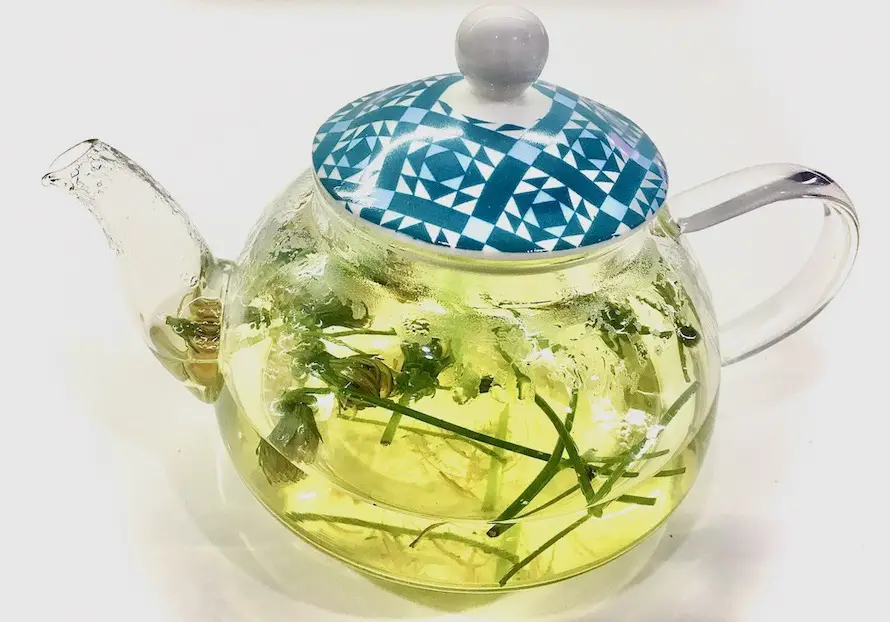
For those looking more for a full-on weight loss regime to lose weight fast, and want to see what teas can help within this area, then I’ve researched these separately.
So I’d recommend reading my articles looking at the ultimate weight loss teas below…
If you’re combining exercise with your weight loss regime, then you might want to consider tea before or after your workout, here are a few articles to check regarding that aspect, but there are others I’ve written too.
Green tea before a workout, or green tea after a workout
Milk tea before a workout
Ginger tea before a workout
Tea Before a Workout: 6 Teas to Get the Best Results and Why
Also, check out the Chinese tea diet.
Green tea alternatives for detoxifying
Many of us like to engage in a body detox from time to time. But you don’t have to compromise on taste or your usual routines.
Green tea is already great for detoxification, but if you want to ring the changes then consider some of the teas below…
Ginger and turmeric tea
Turmeric is well-known for its active effect on helping enzymes flush out toxins and for having a rich antioxidant profile that repairs liver cells.
Turmeric mainly helps the liver in detoxifying metals, while boosting bile production.
It’s also beneficial in preventing damage to the liver, as it facilitates the liver enzyme to remove toxic metabolites.
Ginger on the other hand is highly effective and most sought-after for helping to alleviate bloating. There are a number of teas that can reduce bloating. In fact, green tea is also good for bloating.
So a tea made with these two magical ingredients, i.e. turmeric and ginger can help in detoxifying your system effectively – especially when consumed at night before bed.
You can also read more about Ginger and honey tea benefits here.
Peppermint tea
Peppermint tea is an interesting green tea alternative.
When it comes to detoxifying. Its fresh flavor can also be a good alternative if you don’t like the strong earthy flavors of green tea.
Its vitamin C helps the immune system to keep any viruses and bacteria essential to detoxify your body at bay.
Besides, peppermint tea also helps in clearing air passages that are blocked with mucus.
And the manganese in peppermint tea removes and neutralizes free radicals from the body, thereby helping to detoxify the body.
Another option I’d recommend exploring is Zen tea. You can read more about Zen tea here. It helps to detoxify the body, as well as helping with anti-aging – as we’ll go on to next.
Similar to peppermint, I’d also recommend using lemon tea to detox the body. You can learn more about lemon tea vs green tea here. Or explore the potential benefits of lemon zinger tea.
Ooh, there are just so many tea aspects to explore!
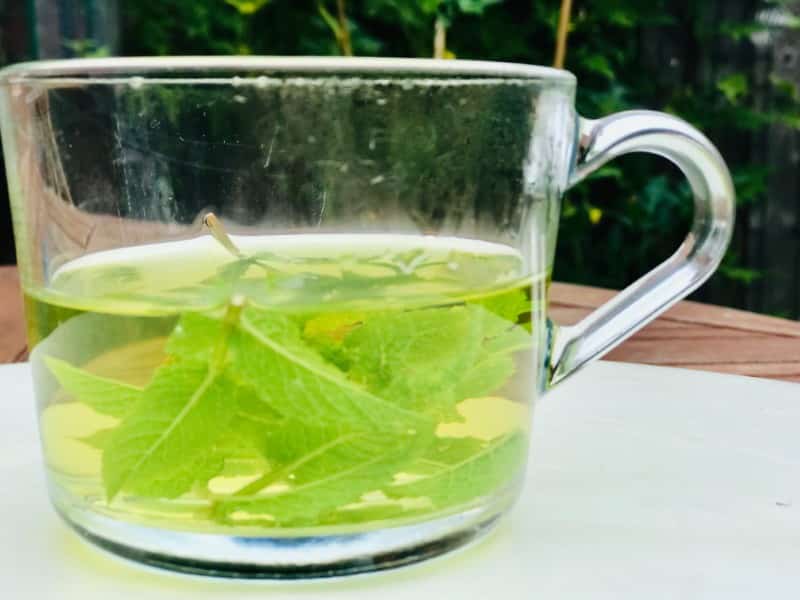
Green tea alternatives for anti-aging
Rooibos tea
Popularly known as “Red tea” in many parts of the world, rooibos tea comes from a South African plant that is perfectly free from caffeine and a great choice among green tea alternatives.
It has excellent anti-aging properties and is also used in a variety of cosmetic products including facial washes and cleansers.
Rooibos tea is also sprayed onto the skin to rehydrate it and is even used as a loose-tea hair dye to turn brunettes or light-reddish hair colors to blondes.
You can learn more about Rooibos tea here.
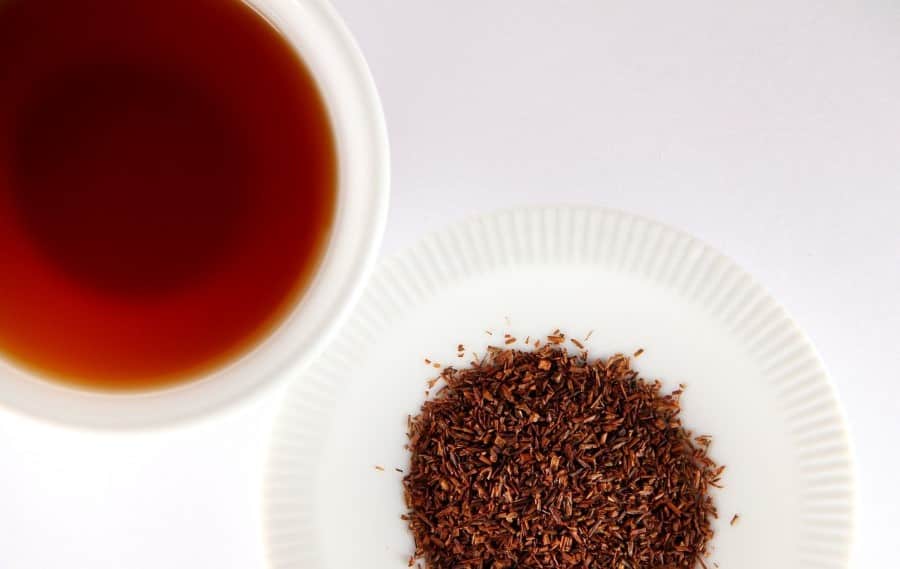
Tulsi tea
The anti-aging properties of Tulsi are well-renowned in Ayurvedic medicine.
Known as the “Queen of Herbs” in India, Tulsi has been used for centuries mainly for its significant effect on stress, antiaging natural detoxification process, and even its benefits for mind, body, and spirit.
For anti-aging, Tulsi tea mainly works by adapting to physical, emotional, and environmental stress and by working to normalize and balance the body.
Read the 21 benefits of Tulsi tea here. And another option I’d recommend exploring is Zen tea. You can read more about Zen tea here.
Alternatives to boost metabolism
Yerba Mate
This is a traditional South American drink known for its rich-antioxidant profile that helps to keep cholesterol levels down and for aiding digestion in a way that helps rev up the metabolism, it’s packed full of caffeine to really boost the system.
Similar to green tea, yerba mate is also packed with catechins, which improves the body’s ability to metabolize fat.
Regarding taste, Yerba mate replicates the strong and bitter taste of green tea but is more vegetal than earthy in flavor, unlike green tea. I write an entire article about Yerba Mate here so you can explore this further.
Help beyond green tea alternatives
So that’s the list of green tea alternatives that I’d recommend you try. If you’re the kind of tea drinker that’s interested in green tea and green tea alternatives, then you’ll love my tea course. It’s the fast-track method to learning more about teas and conducting tea tastings without taking lengthy and expensive tea sommelier courses.
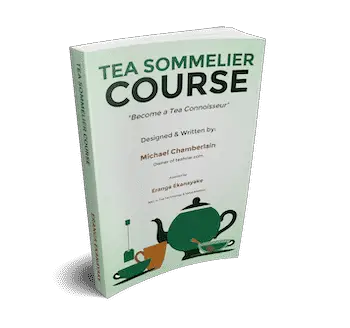
Take the fast track and become a tea connoisseur
Whether for enjoyment or considering a career as a tea sommelier. This course has everything you need to enhance your tea knowledge and tea-tasting skills.
This course keeps it simple with step-by-step tea tasting and easy reference guides
For pleasure, or as a precursor to a career in the tea industry. Find out what tea sommelier actually does, their career paths, and what they earn.

Find out more about the Teahow Tea Sommelier Course!
